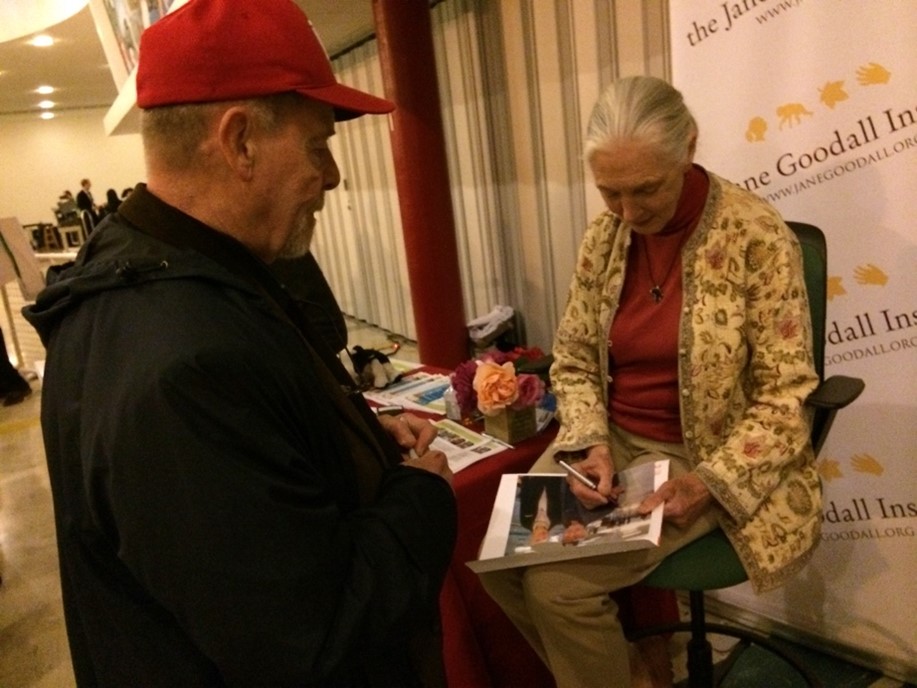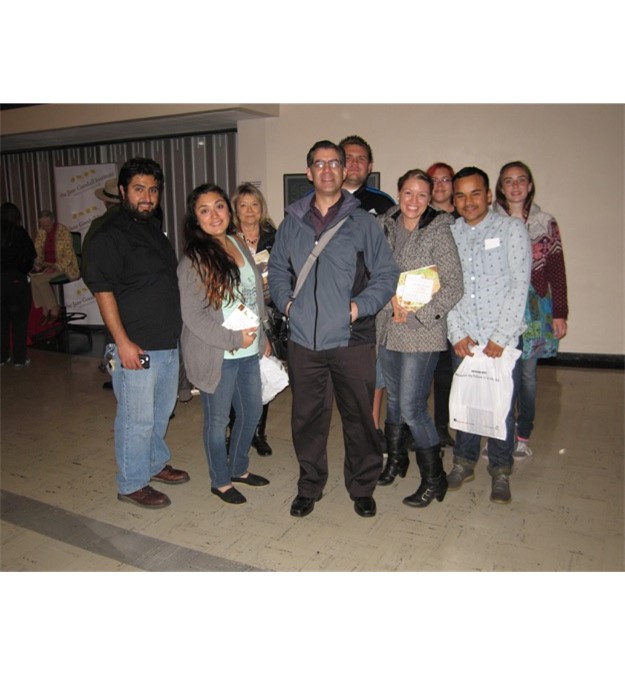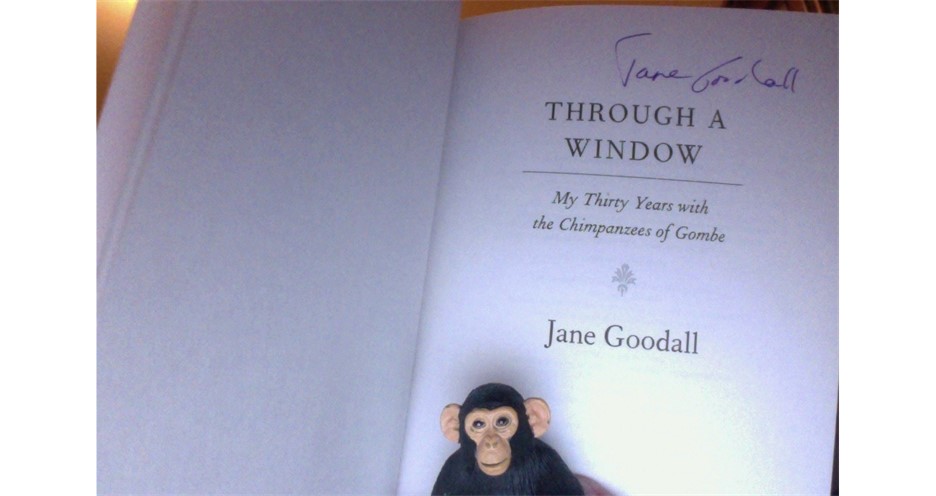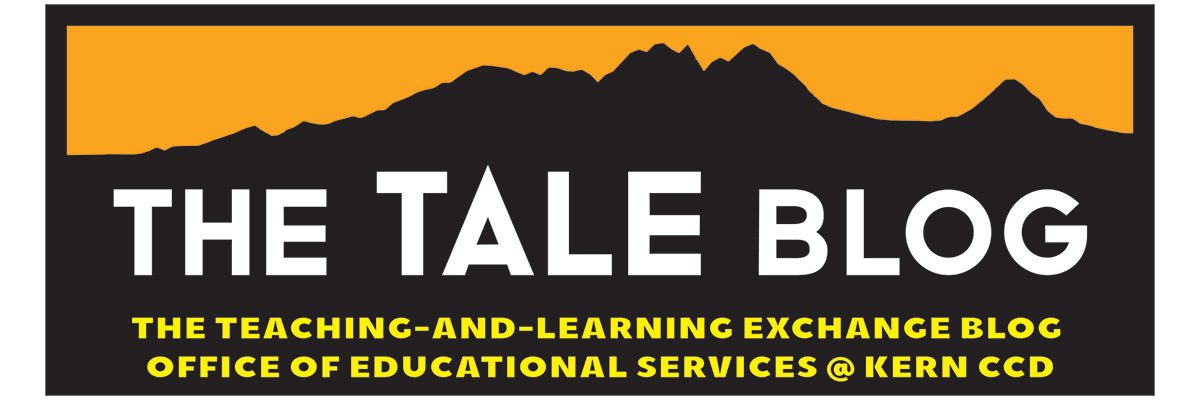by Robert Alan Simpkins
A student in my Biological Anthropology class recently commented to me about a story I have been sharing with my students in that class for nearly a decade now. On Tuesday, April 1st in 2014, I traveled from Porterville College down to Bakersfield College with several Anthropology students and my colleague Richard Osborne – the man whom I replaced in the Anthropology program upon retirement from his full-time position – to see Jane Goodall, the famous researcher known for decades for her groundbreaking work on Chimpanzees in Tanzania, and now also an advocate for global conservation.
Dr. Goodall was appearing at Bakersfield College as part of their Centenary celebration. Richard and I knew that her appearance was specifically due to the efforts of our counterpart at BC, Anthropology Professor Krista Moreland. Bakersfield College had sought a major event for their celebration, and working with then-new BC President Sonya Christian, and with the support of the Wiley and May Louise Jones Speakers Fund, the Bakersfield Californian Foundation, and the Kern County Museum Foundation, Krista had provided it. Holding the event on a Tuesday night created limitations for many people, especially those outside of the immediate area, but for fans of Goodall’s work like Richard and myself, she was a superstar and meeting her was an opportunity we could not miss.
We were pleased to have enough interested students to fill the PC van – a mixture of Anthropology Club devotees and students from our classes – and we all drove in the dark on that school night, packed in tightly, and bubbling with excitement. We arrived a little later than we had hoped and sat high in the bleachers of the gymnasium. Krista came to the lectern and introduced her childhood hero in a moving speech framed by ‘three revolutions’ in human thought – the first associated with Copernicus and the shift away from the earth-centered view of the universe to a sun-centered one, the second associated with Darwin and the shift away from the seeing the separateness of humans among all other living things to one uniting us all through the lens of biological evolution, and the third which she attributed to Jane Goodall, who showed us how much chimpanzees – and by extension other animals – were more like us and we more like them than scientists acknowledged when Goodall started her research back in the 1960s.
Dr. Goodall then approached the lectern, there just two days before her 80th birthday, and was charming, funny, moving, earnest, and profound. Among her stories, she described that resistance she faced initially by ‘experts’, including her own professors, who rejected her claims that animals could think, express emotions, and have unique personalities – views she knew were incorrect from the start because she had learned otherwise from her first teacher: her childhood dog Rusty. Through her persistence and careful documentation of the chimpanzee community of Gombe National Forest over the years, and an eventual change of perspective by the scientific community, her view of animals would become the accepted one, and with it a change in how we saw our relationship to the rest of the animal world.
She signed books after her presentation, and we in our group all stood in the long line outside in a light rain for the chance to meet her up close. I recall thanking her for staying so late and she simply smiled, saying “not at all” and how badly she felt for everyone waiting outside in the cold and rain. Krista later shared that Dr. Goodall insisted on staying until everyone in line had their turn, long after we made the hour-long drive back to PC. I don’t think I finally arrived back at my house until around midnight, and it wouldn’t be long until I had to get up again for another day of school. Yet I left with a memory that still feels like it happened only yesterday, the day we all met one of the most extraordinary people of the modern era.

Above: PC Anthropology Professor Emeritus Richard Osborne with Jane Goodall at Bakersfield College on April 1, 2014. She is signing a photo of the two of them he brought that was taken years ago when he spotted her at LAX in baggage claim. Photo by Krista Moreland.

Above: The Anthropology students from Porterville College along with Richard Osborne’s wife Ginny Osborne (back row left) and myself (center front) after meeting Jane Goodall (backside left, in the chair) at Bakersfield College. Photo by Richard Osborne.
That was the story I had shared with my class, and the memory that had made an impression on the student who had mentioned it to me. The fact that I shared this experience with Richard Osborne, who remained as an adjunct instructor at PC for a few years after his retirement from his tenured position, was also significant because he had been a mentor to Krista before she obtained her own tenured faculty position at BC, and in his time with me at PC, played a similar role. It was from his traditions of providing learning experiences beyond the classroom that I was able to observe firsthand and develop alongside him, that shaped my early role and approach to teaching and service at PC. In those years, we led the Anthropology Club together, taking weekend trips with our students to places they often had never heard of or seen previously. He was dedicated to bringing the club members to community service projects too. And it was Richard, along with a handful of other PC faculty and staff, who over two decades ago started a project called the Cultural and Historical Awareness Program, or CHAP, for which they organized speakers, activities, and events to expand the experience of students and the community beyond the classroom – a project that was later replicated at other nearby colleges as well. Many of those events too provided a unique memory from a time where so much else has been forgotten.
The simple message of appreciation from my student took me back through all of those experiences, and showed me how one person can make a difference through example, influence, patience, generosity, and sacrifice – to provide experiences for others to learn from and remember. I know Krista and I will always value the influence Richard Osborne had on us as newer faculty, learning from him what it means to be a teacher and a mentor. And we will always remember that night when Jane Goodall came to visit Bakersfield College. I hope all those Anthropology students in our van who made the trip down to Bakersfield with Richard and I will also remember it, and all of the other places we traveled to with them, and with so many other students over the years.
When we reflect on our pasts, how many things that we have learned and have shaped us came from the classroom? How many things came from special events? How many came from unplanned encounters or random events? How many came from taking a chance that the time spent on something unknown would be more worthwhile that what we might otherwise have done in that time? In her book, “I Love Learning; I Hate School!”: An Anthropology of College, Susan D. Blum noted that the ways most of us learn in life bear little resemblance to our experiences as students in the traditional classroom, yet as educators we persist in doing it this way despite knowing this. Learning is so much more than credits, grades, and degrees – it’s also the repository of memories that persist, remaining vibrant after so many others have faded, joining the pantheon of experiences with sufficient gravity to remain, and be seen again and again, because what they represent remains significant to who we are and how we see the world. However we pursue our work as educators, we might be driven by that as our standard.

Above: My signed copy of Jane Goodall’s book, Through a Window: My Thirty Years with the Chimpanzees of Gombe, along with my little chimpanzee figurine in my office. Photo by Robert Simpkins.
Works Cited:
2016. Blum, Susan D. “I Love Learning; I Hate School!”: An Anthropology of College. New York, Cornell University Press.
Special thanks for the memories to Krista Moreland, Richard Osborne…and Jane Goodall.

Robert Alan Simpkins has been a Professor of Anthropology at Porterville College since 2012, where he is currently faculty lead for Guided Pathways and the Academic Senate Past President. He previously served two terms as the Academic Senate President, and before that two terms as the Social Science Division Chair, and organized PC’s CHAP (Cultural and Historical Awareness Program) series for five years. Prior to coming to PC, he was an adjunct instructor at De Anza College and at San Jose State University. He has an MA and a PhD from the University of Wisconsin-Madison, and BA from San Jose State University. As an Archaeologist, he is interested in the relationship between roads, architecture, cultural landscapes, and socio-political organization. His particular focus has been the Golconda kingdom in the Indian Deccan region, which was the subject of his doctoral dissertation and on which he has presented his research internationally and published extensively, most recently in the article “Inferring Road Networks and Socio-Political Change from Elite Monuments of the Golconda Kingdom” in South Asian Studies in 2020. Although a native of the Bay Area, he enjoys the farms and orchards of the central valley and the proximity to the mountains, and going on drives and exploring the region with his family. He has a weakness for books, toys, classic movies and animation, art, stories, and anything that he finds amusing.

